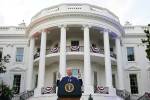EDITORIAL: Time to red-card this stadium plan
The Las Vegas Valley needs a new stadium — one new stadium. And if taxpayers are going to be asked to fund part of the construction costs, the terms must be favorable, the planning process must be exceptionally open and deliberate, and the venue must have flexibility. There must be vetting and more vetting. And then some more vetting.
That’s not happening at City Hall. In fact, Mayor Carolyn Goodman is in such a hurry to build a new sports venue downtown — An arena! A stadium! A driving range/skate park! Anything! — that she’s willing to put taxpayers at risk while keeping them in the dark, grease the skids for private developers and run the entire deal through a spin cycle at high speed to try to mask a plan’s obvious deficiencies.
The proposal for a $200 million, 24,000-seat soccer-first stadium in Symphony Park, announced Tuesday and intended to lure an expansion Major League Soccer franchise, is so bad that it parallels the classic monorail episode of “The Simpsons” — only with fewer laughs and more winces. (Apu, the convenience store clerk: “Pardon me, but I would like to see this money spent on more police officers. I have been shot eight times this year, and as a result, I almost missed work.” Police Chief Wiggum: “Crybaby.”)
This rush job is in stark contrast to the transparency of the process playing out at UNLV. The university’s stadium authority board has met for nearly a year, debating in public various ideas for a new multipurpose stadium on or near campus. On Thursday, the board decided against submitting construction and funding recommendations to the 2015 Legislature, opting instead to present a funding plan, with a request for tax support, to the 2017 Legislature. Credit UNLV Acting President Don Snyder and the board for paying attention to the state’s political climate and recognizing that gaining tax funding for the project would have been exceptionally difficult when lawmakers already will be asked to bolster K-12 education and mental health services, as well as launch a UNLV medical school.
The city had scheduled a pair of public meetings on the soccer stadium proposal, then canceled them on short notice. How convenient that rough financing terms finally were reached just a week before the City Council’s Sept. 3 meeting. The council will be asked Wednesday to approve a “nonbinding” term sheet that amounts to a glorified extension of the developers’ negotiating window. Final approval would have to come by December, but the deal shouldn’t survive next week.
The city presented the terms to the public in the most favorable light possible, declaring the project would be 69 percent privately funded by partners The Cordish Cos. and Findlay Sports &Entertainment. But that figure includes the partners’ costs in purchasing the MLS expansion franchise, as if the city has any business buying a stake in a team. Taking that $102 million out of the equation means the city is on the hook for more than 75 percent of the stadium’s costs, through bonds, hotel room and sales tax revenue, infrastructure development and tax credits. The project’s private partners would be required to cover more than $44 million in stadium construction costs, as well as some of the bond payments through annual rent and other contributions, but make no mistake, taxpayers will be the backstop.
So how does the mayor defend these terms? How can she justify burdening city taxpayers exclusively with the costs of this project? The Review-Journal tried to find out this week, and Mayor Goodman referred questions to Justin Findlay, the managing partner of Findlay Sports &Entertainment.
You read that right. The mayor, who is elected by and accountable to every voter in the city, wants to use city bonds to fund a stadium but doesn’t want to talk to taxpayers about it. If there were any doubt that this was a bad deal, she erased it when she ducked questions. Mayor Goodman has no interest in hearing opposing arguments or critical examination; she’s determined to bring a professional sports franchise to downtown to lock down a legacy for herself and her husband, former Mayor Oscar Goodman, even if her constituents have no desire and no ability to pay for it.
Indeed, the city’s coffers are far from bursting. The city can’t balance its operating budget without tapping reserves; it has a huge, unfunded building maintenance backlog; and its rent payments on the sparkling new City Hall are going up. This spring, Mayor Goodman said the city couldn’t come up with $1.6 million to support a county plan to put 47 new police officers on the street without raising taxes. But now she’s ready to surrender room tax revenue and sales taxes from a proposed downtown improvement district to build a stadium that’s too small to attract large special events? There’s no way the city can afford to take on that risk.
Yes, the stadium wouldn’t be built if MLS awarded a franchise to another city. And yes, the city, not the team’s partners, would own the stadium.
But that’s not enough to justify moving this project forward — especially when gaming entrepreneur Jason Ader is working on a competing proposal to build a stadium and bring an MLS team to Las Vegas. Let’s hear his plan.
Las Vegas needs a new stadium. But the project has to be the right deal. This isn’t it. The council should give this soccer stadium plan the boot.























